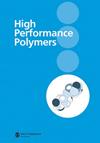槲皮素可持续合成一种新型生物基低温固化苯并恶嗪单体:合成、固化反应及热性能
IF 1.6
4区 化学
Q3 POLYMER SCIENCE
引用次数: 0
摘要
为了使聚苯并恶嗪更具可持续性,以槲皮素、多聚甲醛和苯胺为原料,通过曼尼希缩合反应合成了一种新型生物基苯并恶嗪单体Q-Bz。通过1h核磁共振(1h NMR)和傅里叶变换红外光谱(FTIR)证实了单体的化学结构。用差示扫描量热法(DSC)研究了固化行为,用红外光谱(FTIR)研究了聚合过程。结果表明,该聚合物的熔点和聚合温度都很低(分别为73℃和183℃),并且由于单体开环聚合导致恶嗪环吸收带消失。随后,获得固化后的生物基热固性材料PQ-Bz,并通过DSC和热重分析(TGA)对其热稳定性和热力学性能进行了评价。正如预期的那样,新开发的热固性材料具有高的热稳定性和优异的加工性能。结果表明,PQ-Bz具有较高的温度(约280℃),在800℃、5%和10%的减重温度(分别为349℃和373℃)下炭收率为53%。这些发现证明了新型生物基苯并恶嗪单体在高性能应用中作为传统石油基热固性材料的可持续替代品的潜力。本文章由计算机程序翻译,如有差异,请以英文原文为准。
Sustainable synthesis of a novel bio-based low temperature curable benzoxazine monomer from quercetin: Synthesis, curing reaction and thermal properties
In an attempt to make polybenzoxazines more sustainable, a novel bio-based benzoxazine monomer namely Q-Bz was synthetized via the Mannich condensation reaction utilizing Quercetin, paraformaldehyde and aniline. The chemical structure of the monomer was confirmed by 1 H nuclear magnetic resonance ( 1 H NMR) and Fourier transform infrared spectroscopies (FTIR). The curing behaviour was studied by differential scanning calorimetry (DSC) and the polymerization process was investigated by FTIR. The obtained results showed very low melting and polymerization temperatures (73 and 183°C, respectively) and the disappearance of the oxazine ring absorption bands due to the ring opening polymerization of the monomers. Afterwards, the cured bio-based thermoset, referred to as PQ-Bz, was obtained and its thermal stability and thermo-mechanical properties were also assessed by DSC and thermogravimetric analysis (TGA). As expected the newly developed thermoset exhibited high thermal stability along with excellent processability. Indeed, the results showed that PQ-Bz had a relatively high T g of approximately 280°C, with a 53% char yield at 800°C, 5% and 10% weight reduction temperature (T 5% and T 10% ) values of 349 and 373°C, respectively. These findings demonstrate the potential of the novel bio-based benzoxazine monomer as a sustainable alternative to traditional petroleum-based thermosets in high performance applications.
求助全文
通过发布文献求助,成功后即可免费获取论文全文。
去求助
来源期刊

High Performance Polymers
化学-高分子科学
CiteScore
4.20
自引率
14.30%
发文量
106
审稿时长
1.2 months
期刊介绍:
Health Services Management Research (HSMR) is an authoritative international peer-reviewed journal which publishes theoretically and empirically rigorous research on questions of enduring interest to health-care organizations and systems throughout the world. Examining the real issues confronting health services management, it provides an independent view and cutting edge evidence-based research to guide policy-making and management decision-making. HSMR aims to be a forum serving an international community of academics and researchers on the one hand and healthcare managers, executives, policymakers and clinicians and all health professionals on the other. HSMR wants to make a substantial contribution to both research and managerial practice, with particular emphasis placed on publishing studies which offer actionable findings and on promoting knowledge mobilisation toward theoretical advances. All papers are expected to be of interest and relevance to an international audience. HSMR aims at enhance communication between academics and practitioners concerned with developing, implementing, and analysing health management issues, reforms and innovations primarily in European health systems and in all countries with developed health systems. Papers can report research undertaken in a single country, but they need to locate and explain their findings in an international context, and in international literature.
 求助内容:
求助内容: 应助结果提醒方式:
应助结果提醒方式:


